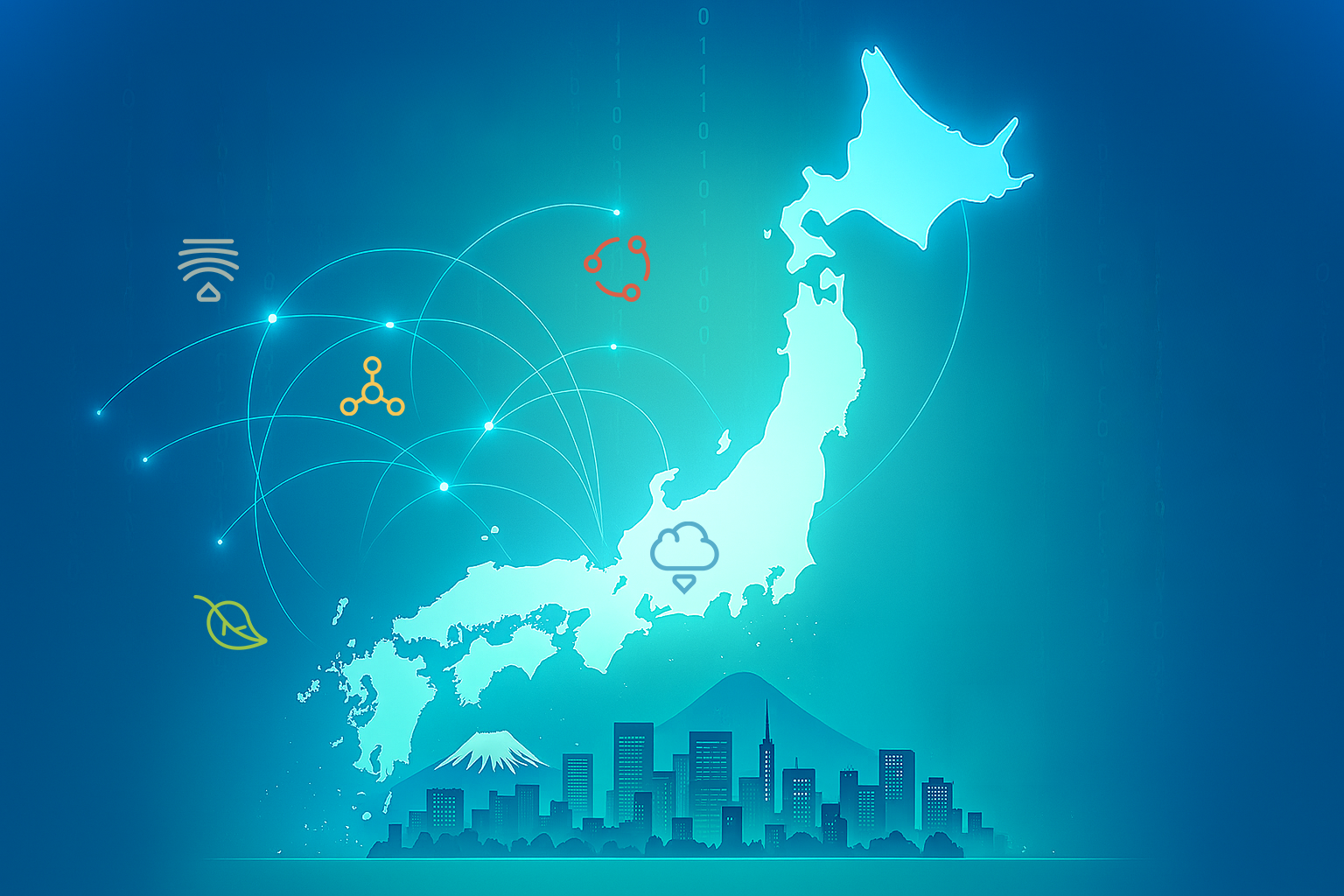ICLEI Members in Japan are scaling action through ICLEI’s five pathways
In fiscal year 2024, ICLEI Members in Japan engaged in various activities connected to ICLEI’s five pathways toward sustainable urban development. These initiatives, featured in ICLEI Japan’s monthly newsletter, were further examined through text mining and other quantitative methods to uncover patterns and insights.

The five ICLEI pathways towards zero emission, nature-based, resilient, circular, and equitable development are designed to create systemic change and serve as strategic guidelines for local and regional governments working toward a sustainable future. What challenges emerged in each pathway, and how did our Members address them?
1. Zero emission: Towards a decarbonized future
At COP29, ICLEI Japan—alongside Saitama City, the Tokyo Metropolitan Government, and Yokohama City—showcased urban climate leadership on the global stage.
Across Japan, local governments are advancing decarbonization strategies tailored to their regional contexts. Tokyo unveiled its “Zero Emission Tokyo Strategy Beyond Carbon Half,” targeting significant reductions by 2035. Kyoto City is promoting building insulation upgrades and energy-efficient appliances, while Kobe is integrating decarbonization efforts into its commemoration of 30 years since the Great Hanshin-Awaji Earthquake.
Iida is pioneering microgrid deployment, and Matsuyama is tackling solar panel disposal—both recognized as practical climate solutions. Kawasaki hosted a joint webinar with U.S. counterparts on climate and public health, emphasizing the co-benefits of decarbonization for community well-being.
Keyword analysis of ICLEI Japan’s 2024 newsletter highlighted frequent terms such as “carbon,” “SDGs,” and “LGMA,” reflecting the strong alignment between local initiatives and international sustainability frameworks.
2. Nature-Based: Cities and nature coexisting
At COP16 in Cali, ICLEI Members in Japan showcased local contributions to global biodiversity goals. Aichi Prefecture, Nagoya City, Kobe City, and Yokohama City presented their initiatives, with Aichi and Nagoya participating in a panel discussion. Kobe and Yokohama also joined the global “CitiesWithNature” initiative, strengthening their commitment to urban nature integration.
Collectively, ICLEI Members are advancing nature-positive actions aligned with the Kunming-Montreal Global Biodiversity Framework. Nagoya City has mapped key biodiversity areas, while Kyoto, Kobe, and Saitama have earned recognition as “Nationally Certified Sustainably Managed Natural Sites” (OECMs).
Hamamatsu City launched a crowdfunding campaign to protect the endangered Tagame beetle, engaging citizens in grassroots conservation. Sapporo City updated its biodiversity vision and local strategy, and Tokorozawa City became Japan’s first “Nature Positive Municipality” certified by NACS-J.
3. Resilient: More flexible and stronger than before
ICLEI Members are reinforcing urban resilience through diverse local initiatives, contributing meaningfully to the global dialogue on sustainable cities.
In May, Mayor Yamanaka of Yokohama City participated in an international conference hosted by the Holy See in Vatican City, titled “From Climate Crisis to Climate Resilience,” where he introduced Yokohama’s decarbonization efforts.
In September, Kyoto City showcased examples of green finance at a TAP webinar, highlighting the synergy between urban sustainability and economic innovation.
Toyota City’s AI-based initiative to predict vacant housing was recognized at the “Digi-den Koshien,” demonstrating a flexible response to population decline and urban hollowing through digital technology.
Sumida City hosted the “Rainwater Network National Conference“, reimagining urban water cycles through rainwater utilization. This hands-on resilience initiative also supports disaster preparedness and helps mitigate the urban heat island effect.
4. Circular: Connecting 3Rs and cross-culture
ICLEI Members are advancing circularity through innovation, collaboration, and community engagement—building momentum toward an inclusive and resilient material-cycle society.
At the ICLEI World Congress 2024 in São Paulo, Kyoto City showcased its clothing recycling initiative, “Release Catch.”
Supported by the Scandinavia–Japan Sasakawa Foundation, Turku (Finland), Tottori Prefecture, and Obuse Town launched a city-to-city exchange on “Food and Circularity,” featuring student visits and collaborative study sessions.
Kitakyushu City presented its plastic product recycling strategy at INC-5.1 in Busan, while Toyama City promoted composting practices in Bali.
Kyoto’s “Vegan Walking” campaign encourages plant-based dining, and Sapporo powers its subway system using surplus energy from waste treatment.
Together, these efforts reflect a deepening commitment to a sound material-cycle society rooted in both local action and international cooperation.
5. Equitable: Toward a society where “no one is left behind”
ICLEI Members are fostering inclusive sustainability by engaging youth, businesses, and communities—strengthening local resilience and co-creating equitable futures.
Tottori Prefecture launched a youth engagement platform, Sado City reached 100 SDGs partner companies, and Okayama City promotes equity through the “ESD Okayama Award.”
Itabashi City raises awareness of the SDGs, while Shimokawa Town facilitates dialogue with multilevel stakeholders through internships and study tours.
Keyword trends in ICLEI Japan’s newsletter—such as frequent use of “members” and “hosting”—highlight a strong emphasis on multi-stakeholder collaboration.
A data-driven analytics of local action
Insights from ICLEI Japan’s 2024 newsletter point to a four-step approach commonly used by local governments to advance sustainability.
- Setting goals – Articulating a shared vision
- Taking concrete action – Implementing targeted initiatives
- Engaging society – Reaching out to communities and stakeholders
- Collaborating and communicating – Building alliances and sharing stories
Throughout 2024, municipalities across Japan took meaningful steps toward a sustainable future, each leveraging its unique regional strengths. What began as local actions in East Asian island communities is now spreading across borders, shaping sustainability efforts worldwide.
Which city’s initiative should we explore next? We welcome your ideas and invite you to connect with us.
AI tools were used to review and enhance the English language translation of this blog post.






